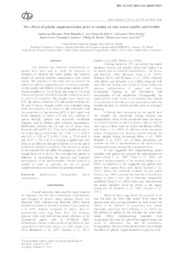The effects of gelatin supplementation prior to cooling on ram semen quality and fertility.
The effects of gelatin supplementation prior to cooling on ram semen quality and fertility.
Author(s): BANDEIRA, A. M. P.; MATOS, J. E.; MARIA, A. N.; CARNEIRO, P. C. F.; PURDY, P. H.; AZEVEDO, H. C.
Summary: The physical and chemical characteristics of gelatin have been used to justify its inclusion in extenders to preserve the sperm quality and improve results of cervical artificial insemination with cooled semen. The objective of this study was to evaluate the effects of gelatin supplementation in cooling extender on the quality and fertility of ram semen stored at 5°C. Semen samples (n = 24) of Santa Inês rams (n = 6) were diluted in Glycine-Yolk-Milk extender without (control) or with 1.5% of gelatin. The samples were loaded into 0.25 mL straws, cooled to 5°C and stored vertically for 48 and 72 hours. Sample quality was evaluated using straw homogeneity tests based on pH, osmolality and the proportion of spermatozoa (PS) in both upper and lower segments of straws (US and LS), analyses of sperm motility, plasma and acrosomal membrane integrity, and by fertility after artificial insemination. Differences between the US and LS of straws were found for pH and PS (%). They were significant only in the control group at both times: pH ? 5.96 vs. 5.71 at 48 h and 6.13 vs. 5.89 at 72 h; PS ? 21.66 vs. 78.34 at 48 h and 20.87 vs. 79.13 at 72 h. Storage in gelatin had very little, to no effect on the sperm kinetics or on the sperm membrane integrity evaluations. The addition of gelatin to the extender did not affect the pregnancy rate which ranged from 4.4 to 26.1%. We conclude that gelatin is effective in maintaining the physical and chemical homogeneity of the semen samples. Further research is needed in order to optimize the use of gelatin supplementation and elucidate any potential benefits.
Publication year: 2018
Types of publication: Journal article
Keywords: Animal fertility, Fertilidade Animal, Sêmen
Observation
Some of Embrapa's publications are published as ePub files. To read them, use or download one of the following free software options to your computer or mobile device. Android: Google Play Books; IOS: iBooks; Windows and Linux: Calibre.
Access other publications
Access the Agricultural Research Database (BDPA) to consult Embrapa's full library collection and records.
Visit Embrapa Bookstore to purchase books and other publications sold by Embrapa.

